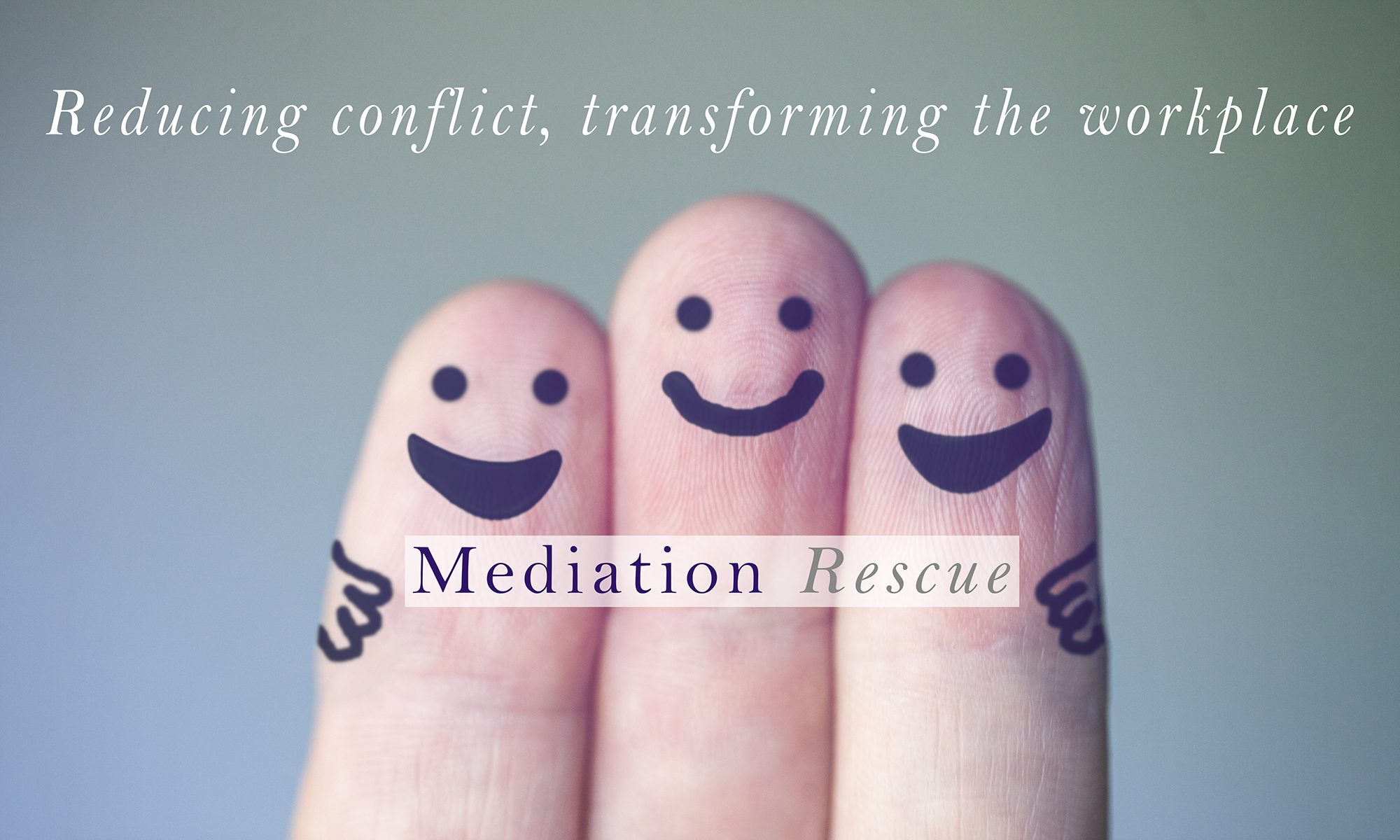Although conflict management lies at the core of everything we do at Mediation Rescue, much of the training that we offer also focuses upon conflict avoidance.
In addition to providing direct conflict resolution services in the form of mediation, we also provide a range of training courses for managers and other staff which will help organisations to avoid or manage conflict better. All of our courses can be delivered remotely at times when face-to-face interaction is not possible.
There will always be conflict within an organisation and although conflict can be toxic and damaging, well-managed conflict can be postively beneficial leading to innovation and impetus for change and improvement. The aim of our training is to provide individuals with the skills they need to manage conflict in more positive and useful ways, leading to enhanced staff retention rates and improved productivity amongst other benefits.
The style of our courses is informal, practical and highly participative. They are designed to be fun as well as informative. All delegates are encouraged to join in so that everyone can learn from each other’s experiences.
Our tutors are all qualified mediators and coaches with high-level expertise in conflict management and resolution, human resources management and employment law. The tutors use a variety of learning methods to suit different learning styles, including team exercises, group discussions, case studies, questionnaires, and time for individual reflection and planning. Case studies and examples can be tailored to ensure relevance to the employer’s business.
All delegates will receive a binder containing copies of any slides and supporting course notes, including materials that can be used for future skills development and reflection.
We currently offer four levels of management development:
1. Conflict Coaching for Managers
This is a one-to-one coaching session with a qualified conflict coach and mediator for individual managers new to management or facing particular difficulties in handling conflict within their team.
Objective: By the end of the session the manager will be able to analyse the specific conflict situation and will have acquired knowledge of a range of practical tools and techniques which can be used to seek to resolve the particular problem and to help to prevent further problems occurring in the future.
This course can also be adapted to assist an employee where mediation is not possible because the other party refuses to engage with a mediation process and the employee finds themselves stuck in a conflict situation.
Timing: 2 hours
2. Addressing Conflict at work: Difficult Conversations and Relationships
This course is designed to be taught to groups of managers or other staff and covers the following topics:
- Common causes of conflict and difficult situations at work
- Conflict at work and its implications in employment law
- The psychology of conflict
- Types of difficult behaviour and techniques to deal with it
- Planning and conducting difficult conversations
- Approaches to conflict resolution
- Mediation – when it is appropriate and the alternatives
- Dealing with accusations of discrimination, bullying and harassment
- Dealing with problems relevant to the organisation, e.g. absenteeism, poor performance, stress, obstructive behaviour
- Managing disciplinary and termination procedures
- Personal action planning
Objectives:
By the end of the programme the participants will be able to:
- Identify the common causes of conflict in the workplace
- Explain the business, legal and ethical reasons for effective management in the workplace
- Identify and understand their own approach to conflict management
- Explain basic employment legislation relating to managing interpersonal relationships and behaviour
- Identify when to involve HR in people management situations
- Recognise different behaviours commonly displayed in conflict situations
- Explain the difference between strong management and bullying and employ appropriate behaviours in difficult situations
- Identify the competencies required for effective conflict resolution
- Apply competencies and techniques to manage difficult conversations, reduce conflict, effectively manage disputes and help achieve resolution
- Develop a personal action plan to develop the competencies required to manage conflict and implement relevant aspects of the course into their workplace.
Timing: 1 day (Max 16 delegates)
3. Key Mediation Skills for Managers
This course is designed to be taught to groups of managers who would like to acquire some of the key skills of mediation for themselves, equipping them to manage conflicts quickly and more informally.
The course content includes:
- Causes of conflict
- Individual approaches to conflict resolution
- Key competencies for successful mediation, including active listening, curious questioning and reframing
- Mediation – when it is appropriate and the alternatives
- The Medi-8 approach to conflict resolution
- The mediator’s role
- Handling the parties’ expectations
- Ground rules for effective and successful conflict resolution
- Understanding body language
- Techniques for dealing with apparent impasse and hidden agendas
- Strategies for helping parties to work towards resolution
- Reaching and recording agreement
Objectives:
By the end of the session the managers will be able to:
- Understand the role of mediation as a means of conflict resolution
- Recognise the appropriateness of mediation to common causes of workplace conflict and its position within the context of current employment law, good practice and the employer’s informal and formal procedures
- Explain the mediation process
- Identify the competences required within their organisation for effective mediation
- Recognise different behaviours commonly displayed in conflict situations
- Identify their own preferred approach to conflict resolution and their strengths and areas for development in different situations
- Develop personal strategies for mediating in different contexts and situations
- Conduct workplace mediation meetings between two people in conflict
- Apply the Medi-8™ approach to mediation meetings
- Use a structured format to draw up agreements
- Develop a personal action plan to develop the competences required for effective workplace mediation
Course Content
Timing: 2 days (Maximum of 16 delegates)
4. Executive Masterclass in Conflict Management Strategy
A half day masterclass for senior and experienced managers to reduce management time spent on people problems and develop strategies and skills to address current important issues – mental health, avoiding discrimination and harassment, meeting legal employment obligations, promoting employee engagement.
The course content includes:
- Analysis and review of current policies and practice
- Analysis of management capability
- The benefits of workplace mediation
- Policies and strategies to improve conflict management
- Managing mental health issues in the workplace
- Implementing workplace mediation
- Managing conflict in and between teams
Objectives:
By the end of the session the managers will be able to:
- Identify areas of positive and negative conflict within the organisation
- Identify the costs to the business of conflict management in time and resources
- Identify areas of strength and weakness in conflict management
- Identify preferred approaches to conflict management
- Develop policies and procedures to support managers and improve the effectiveness of conflict management
- Develop and improve approaches to the management of mental health
- Develop strategies to implement the use of workplace mediation as a conflict resolution technique
Timing: ½ day (Maximum number of 10 delegates)

